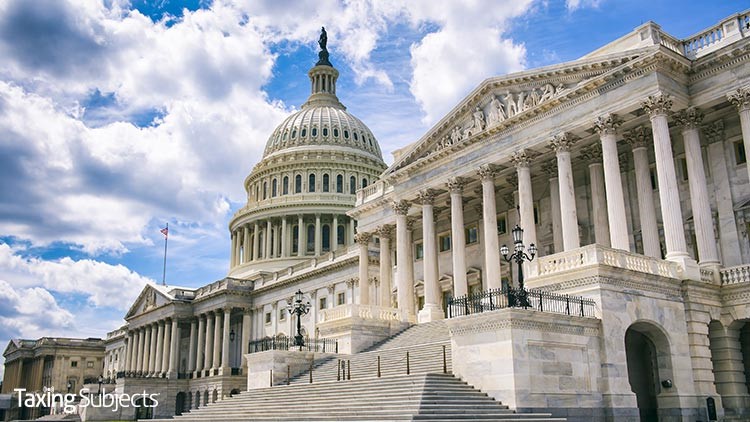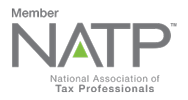by | Jul 11, 2020 | Tax Tips and News
The American Institute of CPAs is asking the Internal Revenue Service to further extend the deadline for filing and paying income taxes. The deadline for filing and payment of tax due is July 15, and the IRS says the agency won’t push back the deadline further.
Accounting Today magazine reports the AICPA makes its case in a letter to the IRS, saying the the COVID-19 pandemic continues to spread and record numbers of cases have been reported across the U.S.
The AICPA sets forth three major areas where the institute believes further relief should be issued:
Penalty Relief
Just like on a regular April 15 tax deadline, taxpayers who fail to file a return or pay the tax due by the July 15 deadline face a penalty. Accounting Today reports the AICPA recommends the IRS waive penalties automatically for the 2019 tax year all the way through the extended filing period for all taxpayers. The institute goes further, asking the IRS to take another look at the impact of the coronavirus during 2021 and consider offering similar penalty relief for the 2020 tax year as well.
Delay in IRS Collections
The AICPA has recommended the IRS stop its automatic collections of liens and levies for at least an additional 90 days after the July 15 deadline. The institute suggests reassessing restarting any collection activities at that time.
Normally, taxpayers receive a series of automated notices if they don’t pay their taxes in full at the time they’re due. The notices demand payment while reminding them of the amount owed and any penalties and interest accrued. The notices are a precursor of the automatic collection process, which continues until the tax debt is paid, or the case is moved to a revenue officer, or the IRS is no longer able to collect the tax legally.
Installment Agreements
At present, taxpayers who can’t pay their full tax bill in one payment can enter into an installment agreement with the IRS. AICPA suggests the IRS create an expedited installment agreement approval process, based on realistic payment arrangements for taxpayers who’ve been affected by the pandemic.
Accounting Today reports the AICPA recognizes the “hardship and uncertainty for taxpayers, and their advisers, and for the IRS,” created by the coronavirus. The institute’s suggestions, AICPA says, simply ask the IRS to do their part in a slowly opening environment.
For its part, the IRS maintains that the July 15 deadline will stay as-is. The agency maintains that its People First Initiative “endeavored to provide unprecedented relief to help those who owed federal taxes and allow them extra time.” But the bottom line remains: taxpayers who didn’t make previously owed tax payments between March 25 and July 15 because they were given extra time to do so, now need to pay up or face penalties or possibly default on their payment agreements.
Our thanks to Accounting Today and to AT Editor Michael Cohn.
– Story provided by TaxingSubjects.com
by | Jul 8, 2020 | Tax Tips and News
The Internal Revenue Service says it has expanded its list of retail partners who accept cash payments for federal taxes. This cash payment option is available for individual and business taxpayers alike.
The IRS has a continuing partnership with ACI Worldwide’s OfficialPayments.com and the PayNearMe Company that allows taxpayers to make their tax payments without a bank account or credit card. They can do so at participating 7-Eleven stores, Ace Cash Express and Casey’s General Stores nationwide.
Taxpayers wishing to use the cash payment option should:
- Go online to the gov/payments webpage;
- Select the cash option in the “Other Ways You Can Pay” section;
- Follow the directions.
- NOTE: There is a $1,000 payment limit per day and a $3.99 fee for each payment.
The PayNearMe process involves three steps, so the IRS strongly recommends cash payers choosing this option to start the process well ahead of any tax deadline to avoid interest and penalty charges.
For taxpayers who do not have a need to pay in cash, there are other options to pay online, by phone or with a mobile device and the IRS2Go app.
IRS Direct Pay is a secure online payment option that allows taxpayers to pay directly from their bank accounts — and it’s free. The IRS has partnered with Official Payments since 1999 for taxpayers who want to use a credit card to pay their tax bill.
The IRS reminds all taxpayers to be aware of email schemes. Taxpayers will only get an email from OfficialPayments.com or PayNearMe if they have initiated the payment process.
– Story provided by TaxingSubjects.com
by | Jul 7, 2020 | Tax Tips and News
The Internal Revenue Service has a little excess cash it would like to get rid of. It comes in the form of unclaimed income tax refunds for taxpayers who didn’t file a 2016 tax return.
The unclaimed refunds are worth some $1.5 billion and the IRS says about 1.4 million individual taxpayers could have a share in the haul if they file a 2016 return. But they need to do it quickly.
“The IRS wants to help taxpayers who are owed refunds but haven’t filed their 2016 tax returns yet,” said IRS Commissioner Chuck Rettig. “Time is quickly running out for these taxpayers. There’s only a three-year window to claim these refunds, and the window closes on July 15. To claim the refund, a return for tax year 2016 must be filed by July 15, 2020.”
IRS Notice 2020-23 extended the due date for filing tax year 2016 returns and claiming refunds for that year to July 15 because of the COVID-19 pandemic. To claim and collect a tax year 2016 refund, taxpayers must file their 2016 tax returns with the IRS no later than July 15.
The midpoint for the unclaimed 2016 refunds, the IRS notes, is $861 — that means half of the refunds are more; half are less. As the commissioner mentioned, there is a three-year period where the refunds can be claimed. After the July 15 tax deadline, any refunds that remain unclaimed become property of the Treasury.
No Penalty to File Late
If a refund is involved, there’s no penalty for filing late. But there are a few things to keep in mind. Taxpayers seeking a 2016 tax refund should know that their checks may be held if they have not filed tax returns for 2017 and 2018. In addition, the refund will be applied to any amounts owed to the IRS or a state tax agency and may be used to offset unpaid child support or past due federal debts, such as student loans.
There is another potential loss to consider for those who don’t make the July 15 filing deadline. Besides the potential loss of the waiting refund, the taxpayer who doesn’t file for 2016 may miss out on the Earned Income Tax Credit (EITC). For 2016, the EITC was worth as much as $6,269.
The EITC helps individuals and families whose incomes are below certain thresholds. The thresholds for 2016 were:
- $47,955 ($53,505 if married filing jointly) for those with three or more qualifying children;
- $44,648 ($50,198 if married filing jointly) for people with two qualifying children;
- $39,296 ($44,846 if married filing jointly) for those with one qualifying child, and;
- $14,880 ($20,430 if married filing jointly) for people without qualifying children.
The IRS says you should get paperwork in order now.
Taxpayers who are missing Forms W-2, 1098, 1099, or 5498 for the years 2016, 2017 or 2018 should get copies from their employer, bank or other payer. If they can’t get copies, taxpayers can order a free wage and income transcript at IRS.gov using the Get Transcript Online tool.
As an alternative, taxpayers can mail Form 4506-T to request a wage and income transcript, which shows data from information returns filed with the IRS such as Forms W-2, 1098, 1099, Form 5498 and even IRA contribution information. The information on the transcript can be used to file the corresponding tax return.
IRS figures show Texas with the largest estimated number of taxpayers with possible 2016 refunds at 143,400 taxpayers. Vermont has the smallest number with 2,800. Alaska leads with the largest median refund amount at $979. Idaho has the lowest median refund: $727.
– Story provided by TaxingSubjects.com
by | Jul 3, 2020 | Tax Tips and News
The office closures suffered by the Internal Revenue Service during the opening weeks of the coronavirus pandemic lead to a near shutdown of the agency’s audit program, a new report suggests.
Between April 1 and July 15, the IRS did not start new field, office, or correspondence audits as part of the “People First Initiative” — unless the statute of limitations would run out and keep the IRS from continuing a case later. All in-person meetings in ongoing examinations were also suspended.
The yearly report issued by the Taxpayer Advocate Service (TAS) says the agency tried to work existing audit cases and refund claims remotely during the shutdown period whenever it was possible. Nevertheless, the report finds that the IRS just couldn’t catch up.
IRS data show that corporate audits during that time fell by 71%; partnership audits were down 79% during the same period, while individual audits were 65% lower than the year before.
Does the report contain contradictory advice?
The TAS report says the IRS advised taxpayers to continue to respond to any IRS examination notice they’d already received — even if it was only to explain why they couldn’t fully comply with the IRS request. But with phone lines temporarily closed and millions of pieces of mail unopened at the IRS, taxpayers’ options for communication were limited at best.
TAS concedes that the IRS did allow taxpayers and representatives to respond by e-fax and could use digital signatures in certain circumstances.
Nevertheless, “Many taxpayers may have trouble obtaining acceptable requested documentation in a timely manner. This leads to delays in examinations, and the IRS may request an extension of the statute of limitations on assessment,” the report finds.
Taxpayers, the Taxpayer Advocate states, will have to weigh the pros and cons of signing statute of limitation extensions, especially when the delay was caused solely by the IRS shutdown.
The report says the way around the bottleneck is clear: “TAS plans to protect taxpayers’ right to challenge the IRS’ position and be heard by ascertaining the status of their audits when the IRS fully reopens and working with the IRS to accept alternative documentation.”
– Story provided by TaxingSubjects.com
by | Jul 1, 2020 | Tax Tips and News
Erin M. Collins, the nation’s new National Taxpayer Advocate, has issued her first report to Congress, which details the series of challenges—some met, some unmet—faced by the IRS this year. The challenges ranged from the COVID-19 pandemic and the subsequent aid and relief programs, to implementation of the Taxpayer First Act.
Collins prefaced the report with an admission that her tenure got off to a rocky start.
“On March 30, 2020, I had the honor and privilege of being sworn in as the third National Taxpayer Advocate,” Collins wrote. “Starting in the midst of a pandemic and witnessing IRS offices closing one by one was not the way I envisioned my role when I accepted the position, . . . but there also has been a silver lining in this experience: As I have participated in conference calls with members of my leadership team, TAS employees, and the IRS’s COVID-19 response team, I have been extraordinarily impressed by their commitment and focus on the health and safety of all employees during this pandemic, while still doing as much as possible to assist taxpayers.”
Collins also praised her predecessor, Nina Olson, who served from 2001-2019, and the very first National Taxpayer Advocate, Val Oveson, who served from 1998-2000. “Over the past 20 years, TAS has successfully assisted more than 4.5 million taxpayers by helping them resolve their tax problems and protecting their rights, and it has made hundreds of administrative recommendations adopted by the IRS and some 45 legislative recommendations enacted by Congress,” Collins wrote.
The Taxpayer Advocate says 2020 is a year fraught with challenges.
In the report, Collins praises the IRS for quick action during the developing COVID-19 pandemic, postponing more than 300 filing, payment, and other time-sensitive deadlines. The IRS also provided relief from compliance actions under its “People First Initiative” and distributed some 160 million Economic Impact payments (EIPs). Collins says these are balanced against some areas where the IRS didn’t so so well:
- Taxpayers who filed a 2019 paper return and are entitled to refunds may be in for a long wait. The IRS had to suspend the processing of paper tax returns, and as of May 16, it estimated it had a backlog of 4.7 million paper returns. Although the IRS is reopening some of its core operations, it is not clear when it can open and process all the returns sitting in mail facilities.
- Some taxpayers whose returns were mistakenly flagged by IRS processing filters are experiencing lengthy delays in receiving their refunds. All tax returns claiming refunds are passed through filters designed to detect identity theft and other types of refund fraud. As TAS has documented, some of these filters produce “false positive rates” of more than 50 percent (meaning that more than half the taxpayers whose returns are stopped by certain filters are entitled to the refunds they claimed). Affected taxpayers are often asked to mail in documentation to substantiate their claims, but the IRS has not opened or processed many of their responses, delaying their refunds.
- Taxpayers who have needed help from the IRS have had difficulty obtaining it. The IRS shut down its Accounts Management telephone lines, so taxpayers could not reach a live assistor by telephone. The IRS shut down its Taxpayer Assistance Centers, making it impossible for taxpayers to obtain in-person assistance. The IRS also shut down its mail facilities, so it was unable to log or process taxpayer responses to compliance notices.
- IRS systems prepared over 20 million notices during the pandemic that could not be mailed due to closure of notice production centers between April 8 and May 31. The IRS is mailing these notices now. However, some collection notices bear old dates and include response deadlines that often have passed. The IRS plans to include “inserts” with these notices explaining that response deadlines have been postponed, but the report expresses concern that receiving compliance notices with response deadlines that have passed will be confusing and concerning to many taxpayers who may not read the inserts.
What were the CARES Act challenges faced by taxpayers?
The report says the IRS generally did a good job in implementing the CARES Act, but here too, challenges remain:
- Individuals who did not receive some or all of their Eonomic Impact Payments may have to wait until next year to receive them. To date, the IRS has taken the position that most taxpayers who did not receive their full payments must wait until they file their 2020 income tax returns to claim the amounts as credits against their 2020 tax liabilities, even though there is no legal constraint on the IRS’s ability to issue additional EIP amounts as advance refunds during 2020.
- Employers are struggling to determine whether they qualify for the Employee Retention Credit (ERC) and in what amounts. The ERC is a complex, refundable tax credit that requires employers to determine when a trade or business was fully or partially suspended by government order; the employer’s number of full-time employees; what constitutes qualified wages; whether a business’s operations post-COVID-19 are comparable to its pre-COVID-19 operations; and the application of aggregation rules. Despite IRS efforts to issue guidance, additional clarification is needed.
- Businesses are facing challenges when seeking to utilize the CARES Act provision that authorizes the use of net operating losses to offset taxable income in prior years (and in some cases to receive refunds). For businesses to determine the optimal application of the CARES Act provisions so they can exercise their right to pay no more than the correct amount of tax, they may need to create and run complex financial models involving multiple tax years.
What was in the National Taxpayer Advocate’s 2020 filing season review?
Usually, the National Taxpayer Advocate’ report to Congress includes a wrap-up on the year’s income tax filing season. Since the filing and pay deadlines were extended due to the COVID-19 pandemic, filing season is still ongoing. But Collins notes that the effects of the various IRS closures and shutdowns had an enormous effect on taxpayers. Among those setbacks were:
- Due to campus and office closures, the IRS could not staff phone lines to assist callers beginning the week of March 21.
- After March 20, taxpayers no longer had access to face-to-face customer service.
- There is a large backlog of incoming mail (about 10 million pieces of mailed tax returns or correspondence sitting in trailers at IRS campuses). The IRS could not process paper returns and process or respond to other written correspondence from taxpayers.
- The IRS has sent only a very limited volume of outgoing taxpayer correspondence.
- There was a substantial reduction in Volunteer Income Tax Assistance, Tax Counseling for Elderly, and Low Income Taxpayer Clinic services.
- The National Distribution Center was shut down, depriving taxpayers of a means to acquire pre-printed forms.
Because of the IRS’s limitations and the postponed filing deadline, an assessment of the filing season is necessarily incomplete. The report says TAS may provide a more thorough analysis later.
The report also takes a look at how the recommendations from the previous report to Congress were viewed by the IRS. The Internal Revenue Code gives the National Taxpayer Advocate authorization to submit administrative recommendations to the IRS Commissioner. The agency is required to respond within three months. However, in 2019 the Acting Taxpayer Advocate made 19 administrative recommendations. The IRS claims it is not required to respond to them and has made only general narrative responses.
Collins writes the intent of the federal statute is clear.
“If the National Taxpayer Advocate makes an administrative recommendation to mitigate a taxpayer problem – regardless of whether or where it has appeared in a report – the IRS should evaluate it and respond in writing so that TAS, Congress, and the taxpaying public know whether the IRS plans to implement the recommendation and, if not, why not. General narrative discussions that do not address recommendations directly fail to satisfy this objective.”
– Story provided by TaxingSubjects.com










